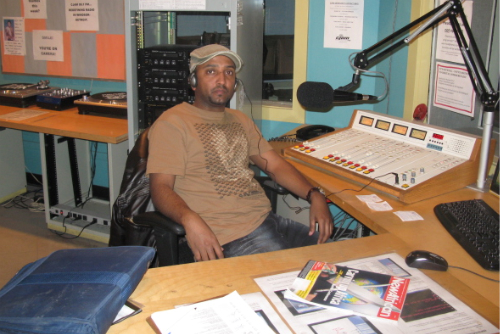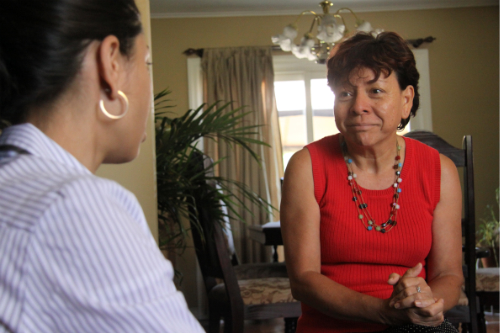Promised Land
with Natasha Fatah
Monday August 23, 2010
Escape from Ethiopia
Posted by Dagna Pielaszkiewicz
 Daniel Biru with his wife Chantal Vero and his sons Abel and Alex Biru. (Mark Ulster)
Daniel Biru with his wife Chantal Vero and his sons Abel and Alex Biru. (Mark Ulster)
Daniel Biru spent a decade on the run across the African continent. He was a student leader thrown in prison, then he became an escapee and a fugitive, and eventually a stowaway who was cast out into the open sea. Hear it all on Escape from Ethiopia.
Episodes appear online at 11 PM EST. Download Escape from Ethiopia as a podcast(updated every Tuesday).
 Daniel Biru hosting Ethiopian Voice at CJAM in Windsor. (Courtesy Mark Ulster)
Daniel Biru hosting Ethiopian Voice at CJAM in Windsor. (Courtesy Mark Ulster)
Monday August 16, 2010
Escape from Honduras
Posted by Dagna Pielaszkiewicz
 Nora Lopez being interviewed by Natasha Fatah. (Courtesy Mark Ulster)
Nora Lopez being interviewed by Natasha Fatah. (Courtesy Mark Ulster)
Nora Lopez's husband Eduardo, a human rights activist, was denied refugee status by Canadian officials, then he was murdered by a Honduran death squad. Nora and her three children had to get out before the same thing happened to them. Hear it all on Escape from Honduras. Episodes appear online at 11 PM EST.
Download Escape from Honduras as a podcast (updated every Tuesday).
 Eduardo Lopez c. 1983. (Courtesy Nora Lopez)
Eduardo Lopez c. 1983. (Courtesy Nora Lopez)
 Nora and Osiris Lopez in Honduras. (Courtesy Nora Lopez)
Nora and Osiris Lopez in Honduras. (Courtesy Nora Lopez)
See more photos on our Facebook fan page.
Listen to past episodes >>
Read Natasha's Blog >>
Air Times
| Network | Times |
|---|---|
| Radio One | Mondays at 7:30 p.m. (8 p.m. NT) and Fridays at 9:30 a.m. (10 a.m. NT) |
| Sirius 137 | Mondays at 6:30 p.m. and 10:20 p.m. ET and Fridays at 8:30 a.m. and 12:30 p.m. ET. |






